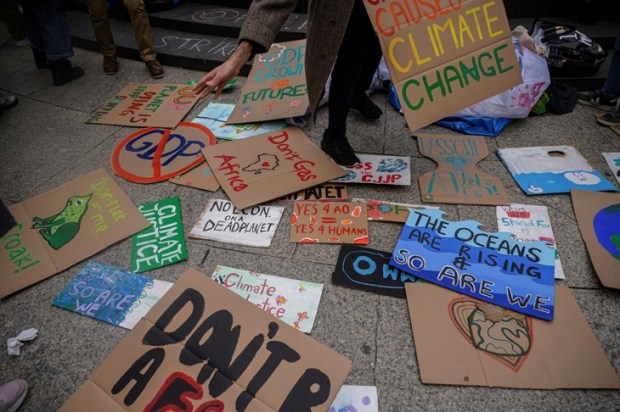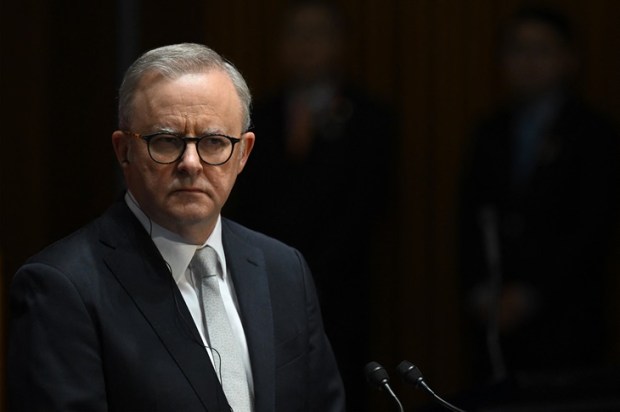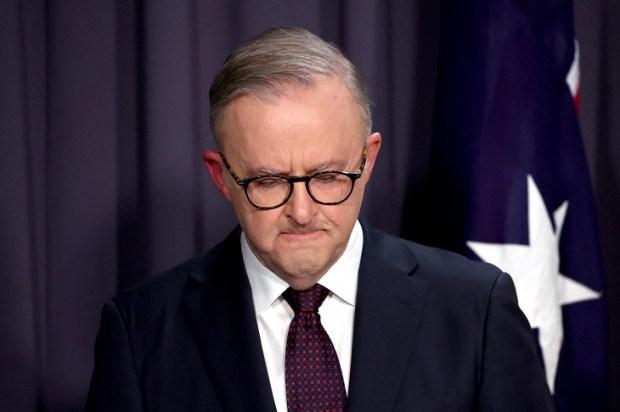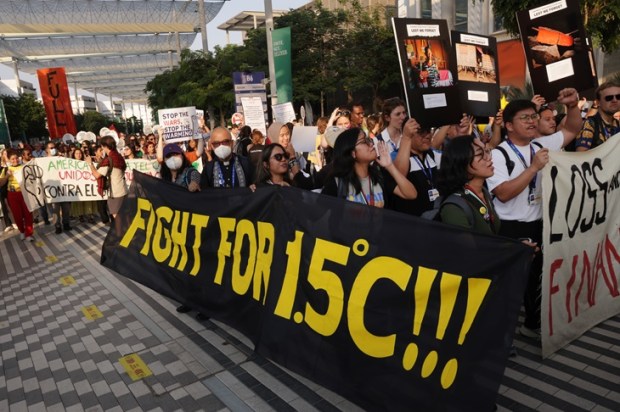Chris Kenny, journalist at Sky News Australia and The Australian, as well as a committed Voice supporter, has been assiduous in calling for a respectful debate. Calling for it, yes. Practising it himself, not so much. Recently, he described Andrew Bolt and former Labor Minister Gary Johns as subscribing to ‘odious’ views and he has no hesitation in describing ‘No’ advocates, including most of his colleagues, as fear-mongers and more.
In the last Weekend Australian he made this ludicrous claim:
The historically significant reconciliation project of the Indigenous Voice has now been seized as a partisan, political weapon to be used against the federal Labor government – any doubt about that was removed this week. Senior Coalition figures now see defeating the referendum as their primary political priority to inflict political damage on the Prime Minister.
It is that ugly. It is that cynical.
This truly is an attempt to turn Australians against each other. And in large part it is motivated not by a concern about the actual reform but by a visceral desire to get Albo, to get Labor.
In other words, Coalition members opposed to the Voice are not genuine in their opposition, in principle, to the Voice being entrenched in the Constitution. He goes on to say that they are risking reconciliation ‘just to take some bark off Anthony Albanese’ and that Dutton’s policy attack is ‘barking mad’. If that were all there was behind the Coalition’s opposition to the Voice, it would indeed be cynical. But, to borrow from Kenny, that suggestion is barking mad. The Coalition’s opposition to the Voice – rather late in coming I must say – was beginning to coalesce as far back as the time National’s leader David Littleproud came out against it. That drove a split in Coalition ranks which previous so-called conservative governments would have run a mile to avoid. In coming to their position, the Coalition itself lost a lot of bark. And Dutton put his leadership on the line on a point of principle. The fact that Albanese is now losing a lot of bark comes down to his own duplicity.
His and Burney’s walk-back from ‘implementing the Uluru Statement in full’, i.e., denying that treaty and truth-telling are inextricably linked to this Voice, is at the heart of his dilemma. The Opposition did not force him to make this stumble, but why should they not exploit it?
Interestingly, in the whole of Kenny’s article, the word ‘treaty’ appears only once, peripherally, and ‘truth-telling’ not all. Neither do the words ‘Uluru Statement’ get a look in. Yet these are at the heart of the current debates in Parliament and they are the reason the Opposition is going in harder than it has before. Yet Kenny describes this response as merely a ‘scare campaign seeking to decry this [a reform designed to unify the nation] as a secretive plot to rend asunder the nation’.
I have repeatedly, in my columns, by email, and by questions in the Comments thread of his articles, asked Kenny where he stands on ‘treaty’ and ‘truth-telling’. Here is my latest effort, from last weekend’s Australian:
Let’s assume you are right, Chris, and this Voice stands alone. Let’s move onto a different but related matter. As a political commentator, do you endorse Albanese’s commitment to implementing the Uluru Statement in full?
I have never had a response to that question.
Kenny has repeatedly described the Opposition, and by extension virtually all his News Limited colleagues, as fear-mongers mounting a scare campaign, but he never explained what the underlying agenda was. Now he has. It’s just to take bark off Albanese. The accusation is that ugly. It is that cynical.
Now we come to an issue that I have been banging on about for months. Kenny’s principal defence of the Voice – that it’s purely an advisory body and the government cannot be compelled to accept its advice. He repeated it in this article which led to the following Comments thread exchange:
PeterOB
‘The people running these scares know full well they are talking about nothing more than an advisory body.’
Then why does the referendum amendment not make this explicit? Why does it talk only about ‘making representations’ not ‘giving advice’? Why does the word advice not even appear in the new section? Could it be because ‘representations’ would be even harder for even ‘a brave government to ignore’ than ‘advice’?
Chris Kenny
Actually it’s the opposite – constitutional experts believed the word advice might insinuate a burden for the government to act on it, ‘make representations’ is a form that makes it very clear the Voice can put things forward but there is no obligation on government to do anything with it.
PeterOB
Chris, you did not answer my substantive question, viz, why is the advisory nature of the Voice not made explicit? If ‘offering advice’ was considered problematic, why could that not be clarified by a statement to the effect that such advice would not be binding on government? And your argument that ‘make representations’ (which can include demands) is somehow more restrictive seems flimsy to me. In the context of a ‘burden on government’, what is implicit in the words ‘make representations’, that is not there in ‘proffer advice’? The difference is not clear to me. Perhaps you could point me to the relevant legal opinion?
I never got an answer, so please bear with me while I imagine the discussion. I see three constitutional law experts, Lawyer A (let’s call him Reg), Lawyer B (let’s call him Brian) and Lawyer X (let’s call her Loretta). It might have gone something like this:
Reg: Now this is an advisory body only and we’ve got to make it absolutely clear that there is no compulsion on the government to accept any advice it gives.
Loretta: Exactly, so we must avoid the word ‘advice’ at all costs.
Brian: What! Why?
Reg (patiently): Because, Brian, the word advice implies a burden on government to accept that advice.
Loretta: Exactly, we have to word it so that there is no doubt that this is an advisory body only. I suggest we say the body ‘may make representations’.
Reg: I like that, Loretta. No one could construe that as meaning anything other than that this is just an advisory body whose advice is not binding on government. We’ll go with that.
Brian: What! Why can’t we just say, ‘There shall be a body that may proffer advice to government, but that advice is in no way binding’, or words to that effect?
Reg, Loretta: Ah, shuddup, Brian.
Excuse my facetiousness. Neil Brown also covers this issue in some detail in last week’s Spectator Australia.
Kenny continues:
The most legitimate arguments against the Voice include the constitutional risk, explored most assiduously by Janet Albrechtsen in these pages. This is an important area for examination.
Still, I would argue it has been well and truly put to bed because from the inception the designers of the Voice have been alive to the challenge. The wording was drafted with input from a broad range of high-level constitutional experts.
With a couple of former chief justices of the High Court, the Solicitor-General and most legal experts ticking off on the current wording, it is hard to undermine the voice with a handful of legal dissenters.
This refers to the question of justiciability, i.e., the potential for the Voice to take a matter to the High Court in defiance of the government. Kenny seems to be saying ‘I have more experts on my side than you do, so case closed. The Voice is not justiciable’. Unfortunately, justiciability doesn’t work that way. Justiciability is not a principle defined in statute law or the Constitution, it is a discretionary prerogative belonging to each individual judge. This is a matter of constitutional interpretation and that is the preserve of the High Court. And it applies to individual cases. The question of whether a matter is justiciable is up to the members of the High Court at any given time. Some judges may rule a matter is justiciable and others may rule not. If four of seven judges decide a matter is justiciable, then the Court accepts that it has jurisdiction over the matter. They will then decide whether or not they will hear it. The court may decide that, even though a matter is justiciable, it will not accept the case if, for example, they see it as trivial or vexatious. The fact is that no one, not on the High Court at the time, can declare a matter non-justiciable. No one, however eminent a former Justice he or she may be, can predict how individual judges in a future court might rule. For Kenny’s assurance that matters arising from the Voice are not justiciable to hold, it would take every former High Court judge to so assert, and even then, it would not be guaranteed. As Einstein might have said, it only takes one dissenter. In this case the view of former High Court judge, Ian Callinan, would be sufficient. He has found that the wording of the new provision would not preclude him from deciding that a matter was justiciable. He is, of course, supported by many other eminent legal minds. And are you confident that the Court which gave us Love and Thoms would rule that every case the Voice sought to bring before it was not justiciable?
Now, let me draw your attention to this statement:
The Voice was the culmination of this process, a neat way to deliver practical rather than merely symbolic recognition and help guard against further mistreatment under our Constitution.
What mistreatment of Indigenous people, I wonder, does our current Constitution facilitate?
There are other dubious claims, but space doesn’t permit me to address them all, however, you can read my take on some of them here.
You are only a fear-monger and the ‘No’ case it is only a scare campaign, if you do not truly believe what you are saying. In other words, you are not acting in good faith. Would you say that former High Court Justice Ian Callinan, for example, is not acting in good faith, Chris?
And in his Sky News program last night, Kenny dismissed Peta Credlin’s expose that the Uluru Statement is actually a 26-page manifesto. He stated that the Uluru Statement was only a one-page document and that all the rest of what Credlin promulgated was just a bunch of records of meetings and so on.
Kenny cannot have read those documents released under FOI. In fact, the documents conclude with one titled ‘Uluru Statement from the Heart’. It is annotated Document 14 and with page number 1. Following this first page there are another 25 pages also annotated Document 14 and all sequentially numbered from page 2. It is hard to escape the conclusion that Kenny is effectively calling Credlin a liar. Now’s that for a respectful debate?
Respect is a two-way street, Chris.

























